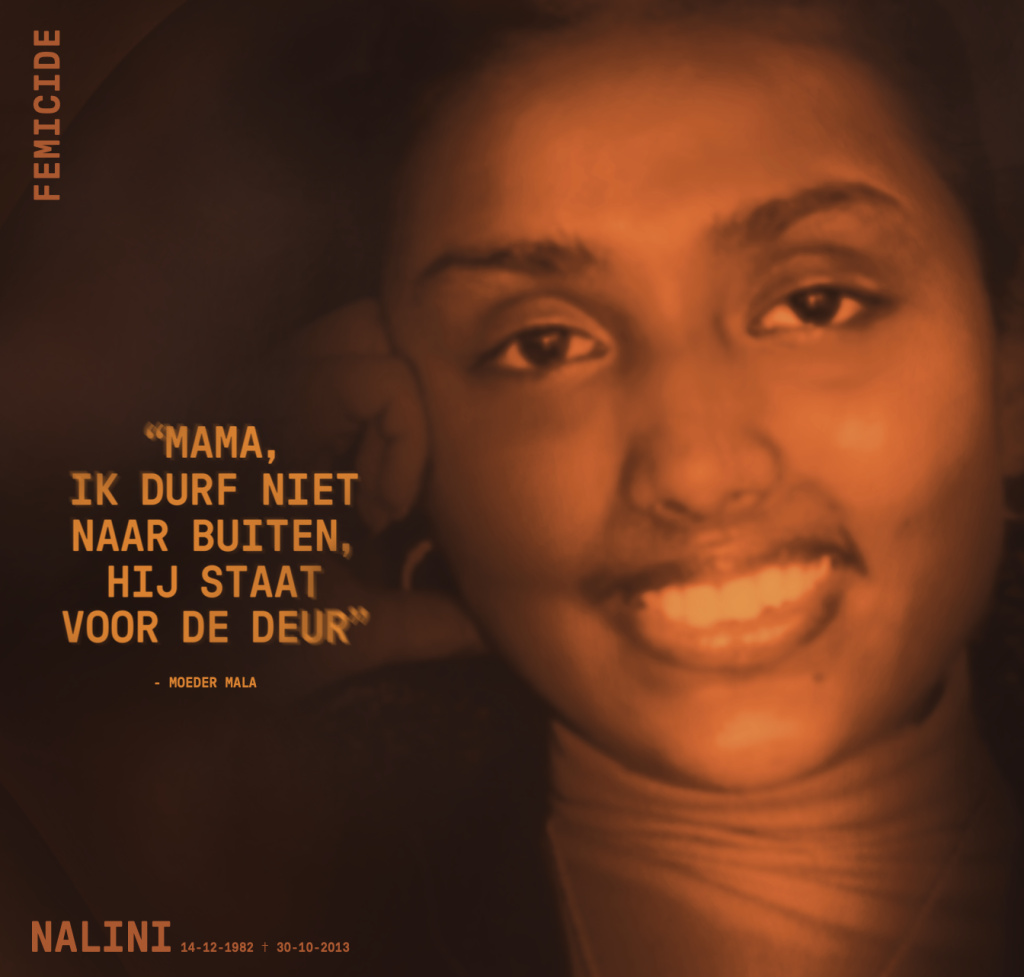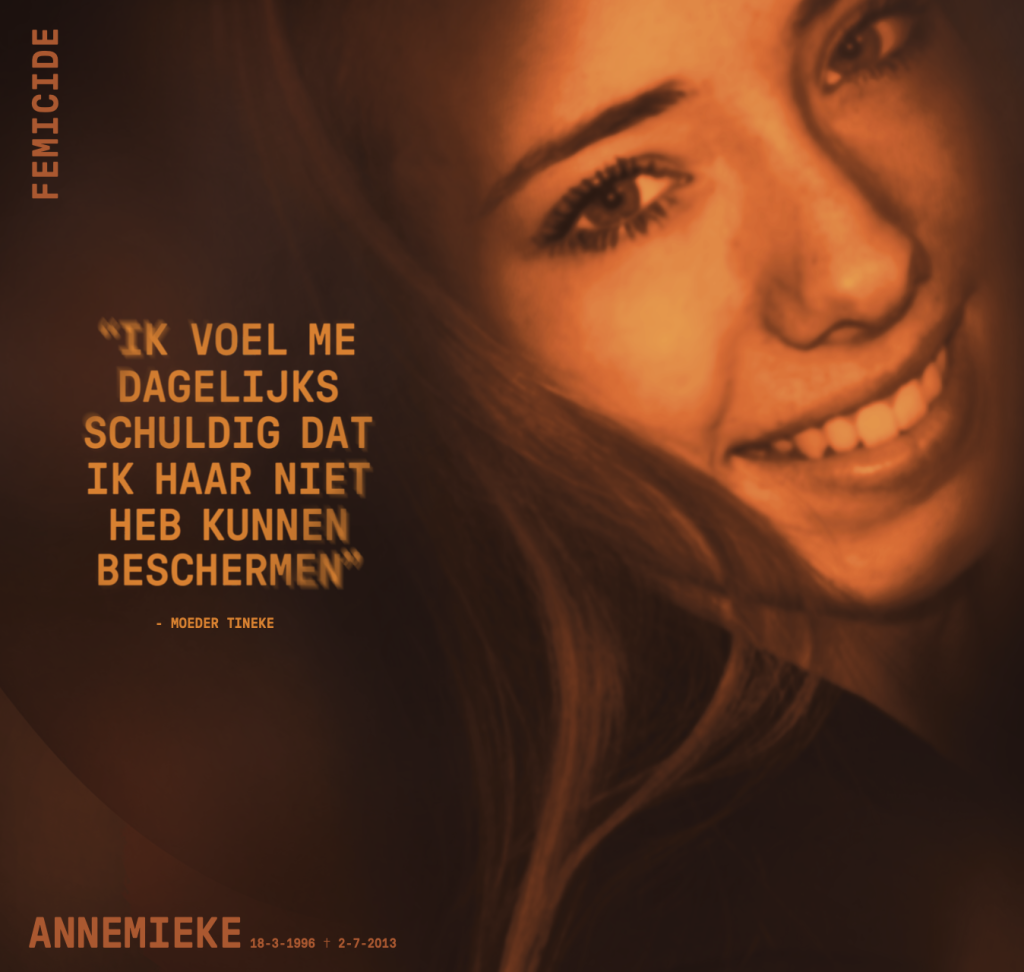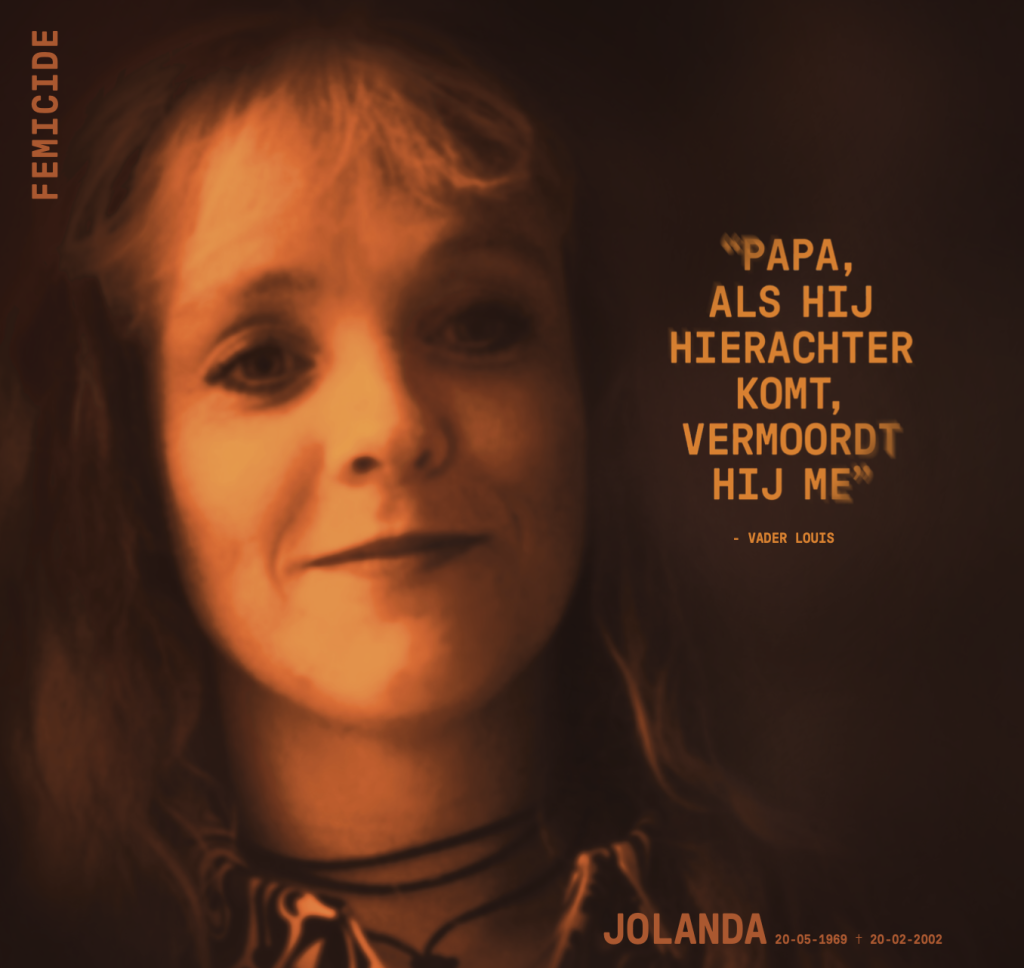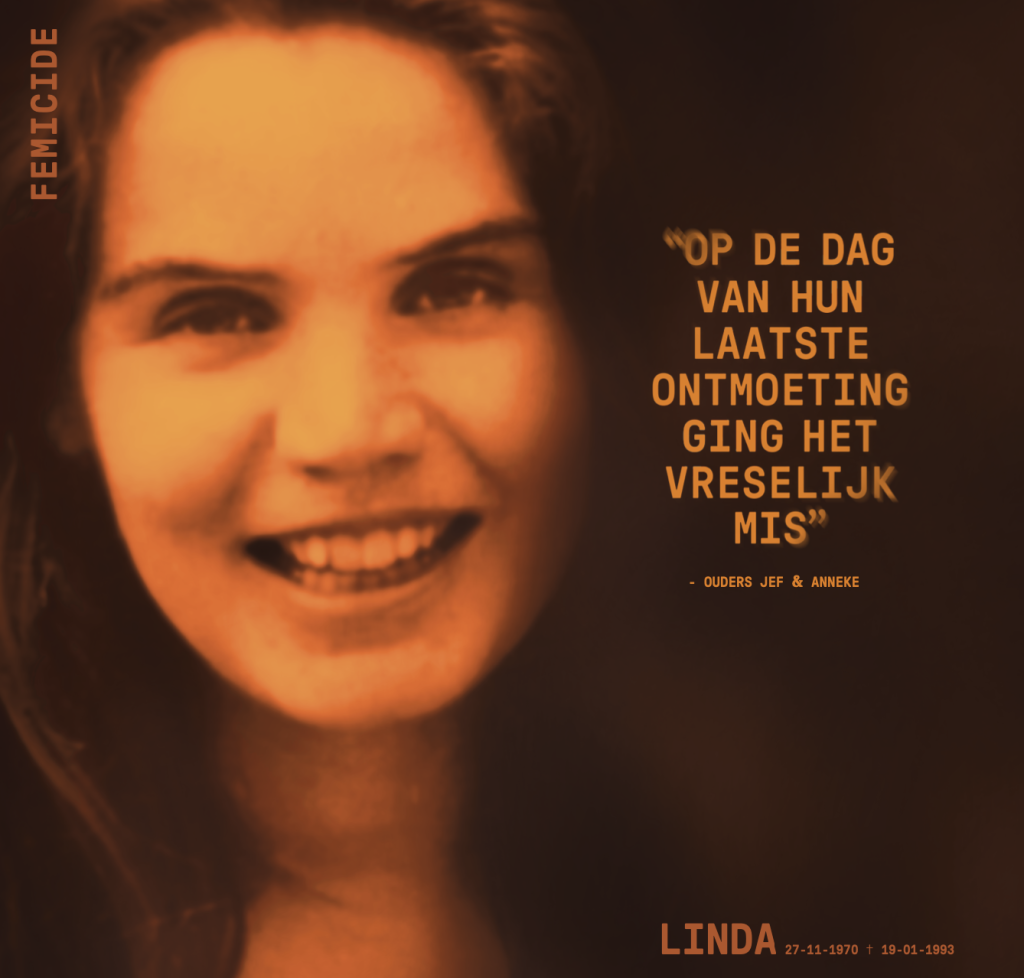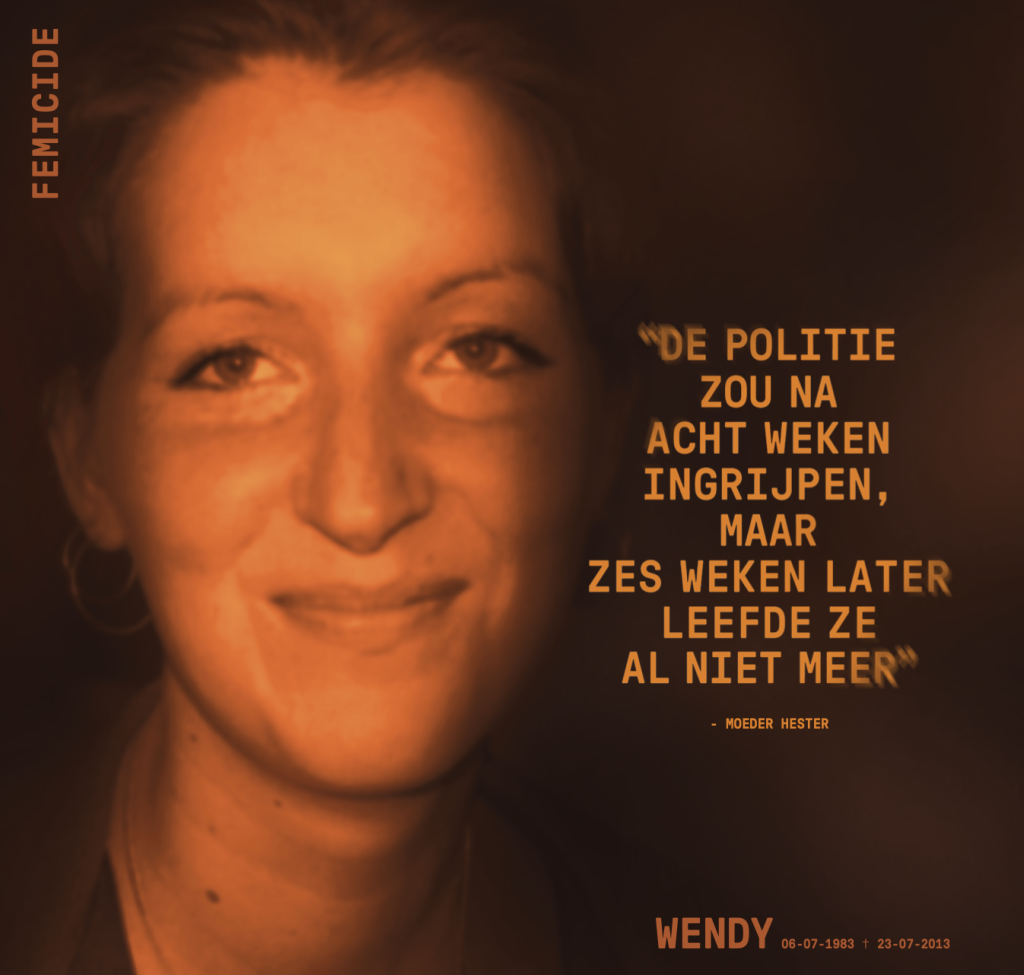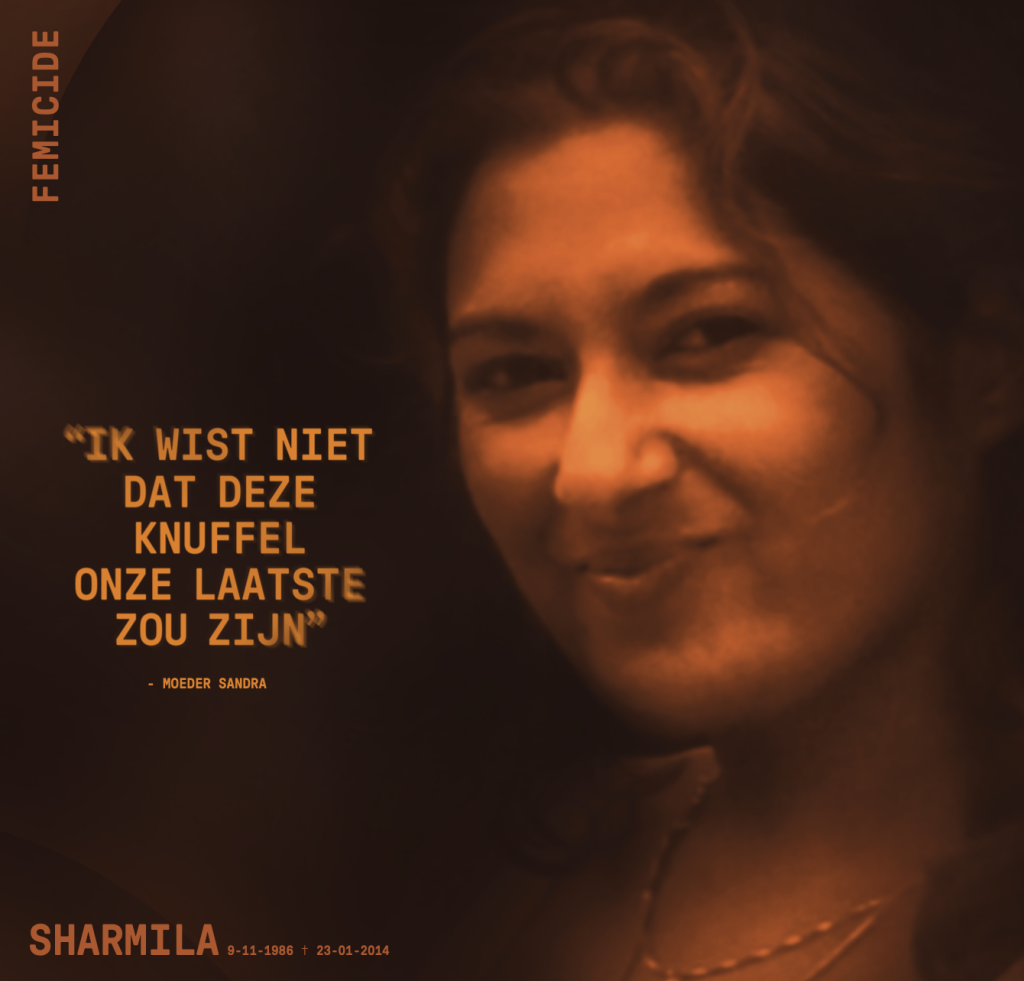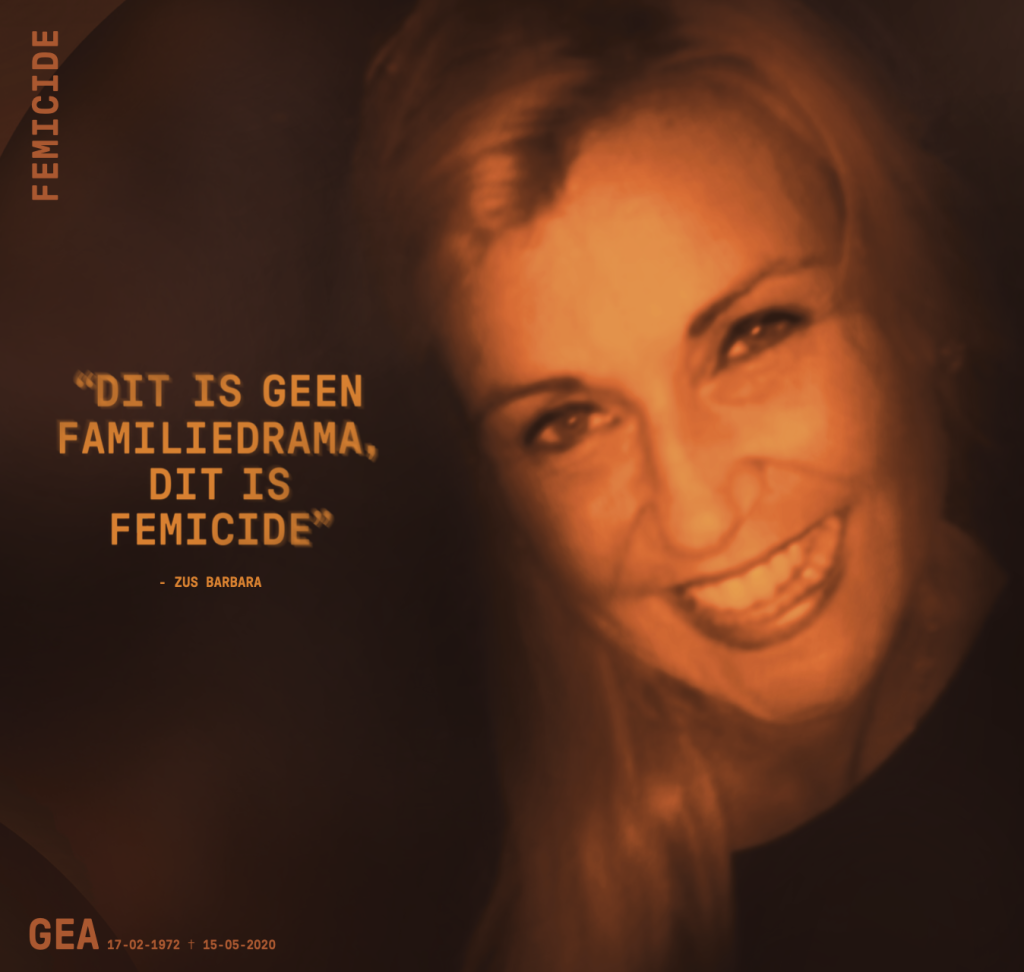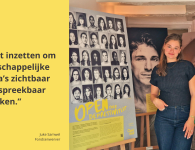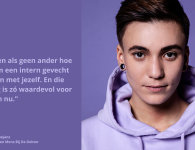Every day in the EU, at least 2 women are murdered by an intimate partner or relative. Women are disproportionately more likely to be killed by their (ex-)partner or a relative than men. The exhibition FEMICIDE alerts, informs and gives a voice to victims of deadly (ex-)partner violence against women and a voice to their relatives.
Read the stories of Laura, Nadine, Nalini, Gea, Annemieke, Sharmila, Shelley, Wendy, Eva, Jolanda, Linda and Clarinda told by relatives below and check out the red flags and tips.
LAURA 12-08-1993 † 11-07-2018 (24) – Story told by Ineke, Laura’s mother
Many people who knew Laura loved her disarming personality. She could connect with anyone, and was always looking for adventure. She worked as a nurse and in her free time she loved clubbing. Tragically, that’s where all the misery began.
My best mate
One night, she was out clubbing when she met a DJ and fell in love with him. It was a year before she introduced him to us. The first time he came to our house, I thought: ‘Is this really Laura’s boyfriend?’ He was extremely quiet and had a strange look in his eyes. After he left, I asked Laura what she saw in him. ‘I just like him, mum. He’s my best mate’.
But he wasn’t who he said he was. He lied about his job, borrowed Laura’s car without her permission, running up a string of fines in her name, and stole money from her account. When Laura found out, she ended the relationship.
Stalking
After Laura broke up with him he started stalking her. It started with flowers and presents, but before long he was showing up at her house all the time and bombarding her with telephone calls and messages. He even visited her at work. Laura didn’t want to report him because she felt protective towards him, but her friends and family finally managed to convince her to go to the police.
The police asked her to provide evidence that she was being stalked. When they had gathered enough evidence, they held him for three days. After his release, he was issued a restraining order and street ban and Laura was given a panic button so that she could alert the police if he came near her. Everything was quiet for four days, and we thought that he had finally got the message and understood that the relationship was over – until that fateful Tuesday evening.
Laura felt as if she could leave this stressful period behind her, so she decided to go to a party and chill afterwards with a friend at her house. But what she didn’t know was that he had followed her, and had been hiding under her balcony all that time. He had made up a story to persuade the neighbours to let him in. When her friend left, he broke into her house via the balcony. It’s not clear exactly what happened, as he gave eight different statements, but one thing is certain: he killed Laura because he could not accept that she didn’t want to be with him.
Powerless
My husband and I were having lunch on Wednesday when he read in the news that a young woman had died in Laura’s street. ‘It’s Laura!’, he cried out in panic. My son called the police and eventually we found out that it was her. We were left in the dark about what had happened and were not allowed to see our daughter. It felt as if my identity as a mother had been stolen from me. Laura was my child, my everything. I wanted to be with her, but instead I could only watch people in white suits going into her house on the news reports. I felt powerless, stunned and in despair. It felt as if I had ended up in some terrible film.
Strength and safety
Laura wasn’t a woman who let people walk all over her; she was extremely strong. Tragically, it was this strength that led to her terrible end. Her story, and that of many others, shows that we have to progress to being a society that is also safe for strong women.
NALINI 14-12-82 † 30-10-13 (30) – story told by Mala, Nalini’s mother
Nalini always came across as being calm and caring. She was a sweet child who wouldn’t have hurt a fly. She was working in home care when she met the man who would change our lives forever. He was also working as a caregiver, but told Nalini that he had studied medicine. She was very impressed by him. I was curious, and happy for her that she had found love, so I invited them both over. But I immediately felt that something was not right.
Charmer
He was a smooth talker, extremely dominant and very charming. But he struck me as being a fraud, and I told Nalini that I didn’t think he was a nice person. But the more criticisms I had, the closer she became to him. They had been seeing each other for three years when Nalini got pregnant, and that’s when everything changed. He didn’t want the child and kept pushing her to get an abortion. Nalini was unsure, but decided to keep the child anyway, so he broke up with her.
Control and domination
After the birth of their son they had shared custody. Soon after that, he married another woman and started causing problems about the co-parenting arrangements. He would sometimes refuse to give their son back to Nalini for as long as three months. He continued to control and dominate Nalini, beating and blackmailing her. Once he threatened to kidnap the boy and take him to Morocco if she didn’t sleep with him. Being forced to have sex with him resulted in another pregnancy.
I begged Nalini to go to the police, but she was too scared. He also kept her son’s passport and refused to return it. When Nalini reported this he received extremely heavy fines. Eventually, they even seized his salary. It was at this point that he snapped. Nalini called me in a panic. ‘Mum, I don’t dare go out, he’s at the door.’ My husband and I stayed close to her for two weeks to protect her, but it was not enough.
No conviction
Nalini was found in the stairwell at the bottom of the stairs. She had been badly beaten. At first, it looked as if she had fallen and the fall had killed her, but we were convinced that he was involved. During the trial, he initially admitted to having been in the stairwell. A reconstruction showed that he had failed to help Nalini, but no evidence could be found because the traces had been removed too quickly by the cleaners. He later withdrew his statement on his lawyer’s advice. Despite being held in pre-trial detention for two years, he was found not guilty of her death.
We will never know exactly what happened that day. During the trial, we discovered that he had forged his medical degree. My gut feelings had been right all along: he was a fraud.
Enormous void
We named Nalini’s unborn child Norah. We miss her and Nalini each and every day. What makes everything even more painful is that we have also lost Nalini’s son. We fought for custody for five years, but our attempts failed and we now have no idea how he is doing.
We ran up €40,000 in legal costs, because we were willing to do anything we could for Nalini and the right to see our grandson, but at the end of the day, we, Nalini’s family, have been left behind with an enormous void in our lives. The government should do more to protect the children of murdered women, because no one should have to endure what we have suffered.
ANNEMIEKE 18-3-1996 † 2-7-2013 (17) – story told by Tineke, Annemieke’s mother
Even when she was very young, Annemieke was incredibly wise. She was always very calm, loving and empathetic. She was a fanatic footballer in secondary school. I used to stand proudly on the sidelines, and I noticed a small group of boys watching the match. One of those boys, two years older than her, became her boyfriend. She was so in love with him. But the first time he came to our house, for a birthday party, I noticed that although he barely made eye contact, he was very alert, monitoring everything that was going on from the corner of his eyes. He had an air of deep insecurity and I didn’t think he was the right boy for Annemieke.
Worried
He rarely talked openly, but when he did, he would tell us about his difficult youth. There were periods when he did not live with his parents, but with his aunt and uncle. He also said that he often had to go without dinner. In many ways he looked lost. I felt sorry for him, and often invited him to have dinner with us. I was still very worried about their relationship. Something didn’t feel right, but Annemieke never mentioned anything to me.
Aggressive
I once witnessed an intense conflict between them. They were supposed to be having a fun afternoon at my mother’s riding school, and I dropped by on my bike as a surprise. But when I arrived, Annemieke fell into my arms, weeping. He had started an argument and thrown things around aggressively. When she tried to leave, he had held her firmly in his grip for two hours to keep her there. I took Annemieke home immediately. She wanted to break up with him, but he begged her not to. He wrote her a letter, saying he was sorry and promising to get help, so Annemieke gave him another chance. He was so scared of losing her that he became almost submissive. He was enormously dependent on her and trailed around after her. This began to irritate Annemieke, and she tried to distance herself from him, but the more she tried to break free, the harder he clung to her.
Final decision
One Saturday evening, they were upstairs in her bedroom when Annemieke broke off the relationship for good. His response was surprisingly calm. They came downstairs, both with tears in their eyes, and he said he would eat at his own house. It felt strange not seeing him at the dinner table. Annemieke was very sad, but knew that it was best for both of them. When she came home from school the next Monday, however, she said that he had not told the others about their break-up. That worried me, and I urged Annemieke not to see him again on her own. A day later, he said he wanted to come round to drop something off.Annemieke was not sure at first, but agreed anyway. He asked her if she wanted to give the relationship another chance, and when she said no, he killed her in cold blood. My son was home at the time, and rushed upstairs when he heard Annemieke screaming, but by the time he got there she was no longer responsive.
Follow your maternal instinct
Afterwards, Annemieke’s friends said that he had often been aggressive and could also be sexually coercive. Annemieke was an incredibly strong and wise girl; I wish that she had told me more about what was going on. I feel guilty every day that I was unable to protect her. So, to all you girls out there: talk openly about your relationships and do not put up with obsessive dependent partners. And to all you mothers: follow your maternal instinct – it’s always right.
SHELLEY 20-05-1998 † 23-06-2020 (22) – story told by Mariët, Shelley’s mother
Even though Shelley and I used to clash sometimes in her teenage years, I was always impressed by her strength and confidence. By the time she was twenty-two, she had already achieved a lot and was working hard to build a good life for herself – and for her two dogs, who meant the world to her. She used to take them everywhere with her.
Secret
She got to know a boy from our village through social media, but in the beginning they kept their relationship a secret. I thought this was strange, as Shelley usually told me everything. When I eventually met him, he seemed to be a well-mannered young man, but they came from two totally different worlds. It had been just Shelley and me when she was growing up, and we’d never had much money, while his parents had given him a very expensive car for his twenty-third birthday.
Luxury presents
It began to bother me that Shelley had started spending much less time with her friends, and I had the feeling that he had something to do with this. I also noticed that he was trying to come between Shelley and me. I don’t think it took much to make him feel left out. Shelley was funny and witty, but it always took him a while to understand her jokes. He often got frustrated because he couldn’t keep up with her. I also noticed that he showed no empathy for Shelley when she got emotional. He used to snap, and yell at her not to make a fuss, then afterwards, he would shower her with expensive gifts.
Isolation
I got a strange feeling every time I saw him. It felt as if he was trying to isolate Shelley, and wanted to keep her all to himself. I think that she was scared of him, and didn’t dare to go against him. Even her dogs didn’t like him. That in itself should have warned me that he couldn’t be trusted.
My last contact with Shelley was though an app message. She sent me a red heart with the text: ‘I love you mum’. A few hours later, my boyfriend rushed up the stairs. ‘Mariët, there’s something going on at Shelley’s house.’ He showed me a news item with a photo of her flat and the headline that a young woman had died. We jumped in the car. Shelley’s street was blue with flashing lights. My life would never be the same again.
Horror movie
It was unbearable having to learn about Shelley’s death through the media, even though people had been milling around the scene for hours. Later, the report said that the gruesome act had been like a scene from a horror movie, but due to a lack of evidence, he was only convicted of manslaughter. There’s a good chance that he will return to our village after his release. I’m not looking forward to the fact that I may soon bump into the person who murdered my child in the street. So far, our attempts to get a restraining order have been unsuccessful.
He had only been going out with Shelley for six months, but there had been many arguments during that time. On the evening it happened, the neighbours had heard loud banging and shouting. I’d always had a gut feeling that something was not right, but I never thought things would go that far. If only I’d paid more attention to my instincts. It is important that we all, as a society, wake up, learn to recognise the signs of intimate terror and stop turning a blind eye to it. Violence within a relationship should always be taken seriously – never trivialised. If you are in a violent relationship, get out of it and report it.
EVA 29-07-1992 † 15-05-2021 (28) – story told by Anneke & Johan, Eva’s parents
Volendam is not so big, and Eva lived just a few streets away from us. She used to pop round for a coffee every day after she had finished her work at the fish shop. Nowadays, when I run into her old colleagues, they always say how much they miss her; the happy conversations and her friendly smile behind the counter.
Moving in quickly
The first time she brought him home, both my husband and I were shocked by his appearance. He had enormous muscles and was covered in tattoos. I think that this intrigued Eva, because it wasn’t long before they were living together. She didn’t tell us that he was using cocaine and steroids, but whenever he visited us I noticed that his hands were shaking violently. Those substances can change your behaviour: they make you more confident, but they can also make you more aggressive.
Socially isolated
That’s exactly what happened. If anyone looked at Eva for an instant too long, he would storm up to them in a rage. He was very controlling, and forced her to video chat with him constantly when she went out so that he could check who she was with. Eva became totally socially isolated. If he’d had his way, he’d have kept her in a cage.
Finally, unable to stand this behaviour any longer, she broke up with him. He was heavily in debt by this time because of the drugs, and was told he could pay off his debts if he enlisted in the foreign legion. So he tried that, but it didn’t last long. He fled back to the Netherlands and told Eva about his traumatic experiences. She had missed him while they were apart, and because he was clean and she wanted to help, she let him move back in with her. But within three months he was back on the drugs and saying that he could hear voices in his head. When she asked him to go into therapy, he would nod in agreement but nothing ever came of it.
Daily drug use
The relationship became even more suffocating than it had been before. Eva bought a book about narcissism in the hope of finding a way to deal with him. She had hidden it because obviously it wasn’t a good idea for him to find it. He was using cocaine and other substances on a daily basis during this period. One Saturday evening, Eva walked into our kitchen looking absolutely crushed; she couldn’t take any more. We tried to get through to her.Surely she couldn’t go on like this? Eva agreed with us, but she knew that she had to think very carefully about how to break up with him because the drugs had made him so unstable. Dejectedly, she left to go home. She walked out of our house that evening at twenty-five minutes to nine. The autopsy revealed that she was already dead by nine minutes to nine. When Eva didn’t answer my messages on Sunday morning, I messaged him. He said she was in the shower, but I didn’t believe him. When we arrived at their house, the curtains were drawn. I started banging on the windows, but no one opened. Apparently, he was inside, trying to commit suicide. The police broke in and found him bleeding in the bathroom. Eva lay lifeless on the sofa.
Hoping to fix him
He had taken cocaine and steroids that evening, and drunk a bottle of vodka. The book about narcissism was on the table, so we think that he had found it and exploded in rage. This man had severe mental health problems, and Eva had thought that she could fix him. It cost her her life.
JOLANDA 20-05-1969 † 20-02-2002 (32) – story told by Louis, Jolanda’s father
People often say ‘You’re not still talking about that, are you?’ They don’t understand that grief like this lasts a lifetime. It’s almost 22 years since my daughter Jolanda was murdered by her ex. I was in hospital undergoing an open heart operation at the time of her death. When I woke up, there were two detectives sitting by my bed: they suspected me of her murder. My family and I were regarded with suspicion, interrogated for weeks, and offered no support whatsoever, while at the same time the killer was seeking comfort from us. You never really get over a trauma like that, no matter how hard you try.
Broken contact
Jolanda was the eldest of our four children. We were a very close family, but something changed when she was fifteen and met a boy six years older than herself. It started out as a friendship, but developed into a romantic relationship. We noticed that Jolanda was withdrawing from us more and more and didn’t want to talk to us about her relationship. We didn’t disapprove of it, he always behaved very well around us, but we sensed that he was slowly pulling Jolanda away from us. He wanted her all to himself. They cut off contact with us once they started living together.
After a few years, we slowly began to see more of Jolanda again. We tried to improve our relationship by suggesting that we all go on a family holiday to Turkey. He refused, but Jolanda decided to join us. When a waiter innocently asked her for a date though, she said something I found extremely disturbing: ‘You mustn’t tell anyone, daddy. If he ever finds out about this, he’ll kill me’.
Premeditated
Six months later her fear became reality. Jolanda had finally found the courage to end the relationship, but two weeks later, on the day of her murder, he went to her house ‘to pick up some stuff’. It seems he had already made a plan. He killed her and covered his traces by wrecking the entire house to make it look as though someone had broken in. The detectives suspected us. Meanwhile, the real culprit used to come to our house for sympathy. He kept this charade up for six whole weeks. It only stopped when I found evidence: the murder weapon with his finger prints on it.
No acknowledgment
He never confessed to the crime, but it’s clear to us that he could not accept that Jolanda had ended the relationship. A comment he had made earlier says it all, really: ‘If I can’t have her, no one else will’. We received no support whatsoever throughout that period and the investigation began to take its toll. The entire family was subjected to long interrogations for weeks on end. Our youngest daughter was so traumatised that she even began having suicidal thoughts, and it was not until then that we finally received some help. This has brought us closer together as a family, but it still upsets us that there has never been any acknowledgment of what we had to go through.
The aftermath of a tragedy like this makes it clear that there should be more attention for the families of victims. People need immediate help, not endless waiting lists. They also need understanding because the loss of a loved one, like our Jolanda, is something you carry with you for the rest of your life.
CLARINDA 23-09-1986 † 08-09-2021 (36) – story told by Lia, Clarinda’s mother
I always gave my daughters a lot of freedom as children, and encouraged them to become independent women. Clarinda, my youngest, was the living embodiment of this. She was a criminologist, and worked for the child protection service, where her goal was to ensure that children could grow up in safety. Clarinda loved life and was always willing to help other people.
Isolation
She met a man on a dating app, and at first everything seemed perfect. He was a teacher, one of those cheerful types. The first year of their relationship went smoothly; they were head over heels in love. They moved in together, and that’s when everything went horribly wrong. No one was allowed to come round to the house. He wouldn’t allow any visitors and Clarinda became totally isolated. Even we were not allowed to see her anymore. But Clarinda insisted that she enjoyed the privacy. It was awful, but I didn’t feel that I should interfere.
Black and blue
The relationship went downhill further after Clarinda got pregnant. Six weeks after the birth of their child, she called me up in tears, saying: ‘You need to come now, I have to get out of here’. I will never forget what I saw when I arrived at her house. Clarinda was shockingly thin and she had been beaten black and blue. She told me that he had abused her during her pregnancy and that she had fled to a hotel several times. I took her home with me and asked her if she wanted to come live with us. She seemed to agree at first, but three months later she decided to move back in with him.
He had persuaded her to return by expressing remorse during the visiting hours when he was allowed to spend time with their child. He promised to go into therapy and do whatever it took to get his aggression under control, so she gave him another chance. I was worried sick, but every time I asked her how things were she would say: ‘Mum, I know what I’m doing, everything will be all right’. I had faith in her, because she knew exactly which agencies to contact and she was a strong woman with a highly developed sense of responsibility, but I no longer trusted him.
Promises
Despite all his promises to change, the violence continued and Clarinda decided to end the relationship to protect her daughter. The house where she was living with her daughter was in his name, so she wanted to register it in her own name. This led to a court case, which made him very hostile. In hindsight, I think that he had been hoping that they would get back together, but this step meant that there would be no way back.
When she came to us that afternoon to arrange the paperwork, he was waiting for her in the parking space outside our house. In broad daylight, and in front of dozens of people, he took Clarinda’s life in a shocking act of violence.
Prevention
Because of her work for the child protection service, Clarinda knew exactly what she was dealing with. Despite her shame at finding herself in such a desperate situation, she had made several reports to the authorities. Even though he was known to the police and mental health care services, no one had anticipated that this would happen. Something has to change with regard to the poor communication between organisations and the lack of knowledge about femicide. Deep down, I think that my daughter’s murder could have been prevented.
LINDA 27-11-1970 † 19-01-1993 (22) – story told by Linda’s parents, Jef & Anneke
Linda met him at the canoe club. It was immediately clear that he was not an easy person; he had had a difficult childhood and was being treated for behavioural problems. Despite his complex personality, Linda saw something in him that others couldn’t see. Thanks to her love, he started to feel better; he felt safe with Linda. After two years of dating, when they were just eighteen, they decided to live together. I didn’t think it was a good idea, but I didn’t want to hold her back.
Trapped
After about five years, Linda began to feel extremely trapped in their relationship.He was very negative, stayed at home all the time and never felt like doing anything. This made her feel as if she was trapped in a dull marriage. When she broke up with him, however, he was furious. He blamed her for all his troubles, and in a letter that was found later in their house he had written: ‘She has turned my life into a dead end’.
Last encounter
Linda did not survive their last meeting. He had already worked out how he was going to kill her, and had described every detail in letters that were found later. His plan was to kill himself as well, but he survived the suicide attempt.
My wife and I went into shock when we were told that our daughter was dead. The thing that is impossible for us to understand is the way we were just left to cope with everything by ourselves. We didn’t receive any details about Linda’s death from the police or any official agencies, but had to hear them on the radio. We were not offered any victim support at first, but only received help weeks later after approaching agencies ourselves. Instead of receiving help, I was subjected to a lengthy police interrogation because I was the last person to see her alive.
Crime of passion
Although it was clear from his letters that this was a premeditated murder, he was acquitted of murder and sentenced for manslaughter.His lawyer called his act of violence a ‘crime of passion’ as if it was an act of love. How on earth could they suggest something like this? It was not possible for us to express our bewilderment as there was no opportunity for us to speak in the court room. We felt completely powerless.
Peer support
In our quest for justice and support, we met other parents who had suffered a similar loss. It was comforting to be able to share our pain with others in the same position, and we decided to set up the Association of Parents of a Murdered Child. Nowadays, we are known as the Federation of Relatives of Victims of Violence (FGN). Together, we fought for the right for the families of victims to speak in court. Thankfully, that right was granted in 2005. Before then, bereaved relatives were not allowed to speak in the court room, although defendants were allowed to express their feelings, an opportunity they often used to excuse or play down what they had done; they literally had more rights than those they had wronged. I think that allowing relatives to speak in court has made it clear that there is no such thing as a ‘crime of passion’. If someone who commits a murder has a mental illness, it’s only natural that the sentence will take that fact into account: but it is still murder.
WENDY 06-07-1983 † 23-07-2013 (30) – story told by Hester, Wendy’s mother
Wendy was very spontaneous. Sometimes I thought she could be a bit impulsive, but she was a sensible girl and took very good care of her little boy. She remained single for a while after her divorce from his father, until she met a guy on an online dating site.
Determined
The first years of their relationship were good. But one day, we were sitting together at my kitchen table when she started crying.She had caught him still actively using dating websites. Despite this, Wendy was determined to fight for their relationship; giving up was not her style. They made up, moved in together and started raising her son together. It all seemed to be going well, but looking back I don’t think that Wendy told me everything. Eventually he ended the relationship because he said it was stifling him. I thought Wendy would be sad, but instead she seemed to be relieved.
Stalking
Just two days afterwards, he said he wanted her back because he was sorry, but Wendy made it clear that she wasn’t interested in reviving the relationship. He couldn’t accept this, and so the stalking began. He hacked her social media account and would stand outside her house for days, peering through the window. He also threatened her. ‘If I can’t have you, no one else will’, he said. His behaviour was terrifying. He killed one of their three cats because he didn’t get his own way when it came to dividing their possessions. ‘It’s easier to divide two cats, than three’, he said, ‘so one had to die’.
Wendy filed charges against him. He turned up again in her garden when he found out and said that he would stop stalking her if she withdrew the charges. So that’s what she did, but the stalking continued. She was advised to keep a diary noting the times and ways in which he stalked her. The police said that they would not take action until he had harassed her for eight weeks; but six weeks later, Wendy was dead.
Secure psychiatric hospital
Wendy used to keep her windows closed because she was afraid of what he might do to her. But that night was swelteringly hot, so she left a window slightly ajar. He drove kilometres to borrow a ladder from a friend who worked as a painter, and then forced his way into her house through her bedroom window. He killed her, unaware that her child was also in the house. The next morning, Wendy’s son jumped on her bed. When he was unable to wake her, he called 112, the emergency number. He was just seven years old. Wendy’s killer was arrested that same evening. He was initially found guilty of murder, but he lodged an appeal. Because he had various disorders and it could not be proved that he had intended to kill Wendy, the charge was reduced and he was only found guilty of manslaughter. After three years in prison, he was transferred to a secure psychiatric hospital.
The right to speak
During the court hearing, I made use of my right to address the court to describe what his actions have done to our family. I had to talk to his back, which was terribly frustrating, but it was still a relief and felt like a form of closure. Nowadays, you have the opportunity to look the perpetrator right in the eyes. I really wish that had been available to me. The criminal justice process is better than it was ten years ago, but it is absurd that the police still don’t intervene sooner in such serious instances of stalking.
SHARMILA 9-11-1986 † 23-01-2014 (27) – story told by Sandra, Sharmila’s mother
Even as a child, Sharmila was extremely independent and full of rebellious energy. Our family consisted of my new husband, Sharmila and her younger brother, both from my previous marriage. We were always very open-hearted with each other, sharing everything. We had strong family traditions that we all enjoyed sharing during the holidays, and these were very important to us.
Isolation
When Sharmila was 26, she met a man in a café and their relationship developed very quickly. Before she met him, Sharmila had been a determined young woman who valued her financial independence, and never let anyone boss her around, but as the relationship progressed, I noticed a change in her. She became quieter, and her visits became less frequent. It felt as if he was trying to isolate her.
Back when she still used to talk to us openly, she had told us that he had once had a drugs problem, but she never told us he was using again, or anything about their fights and the way he abused her. She used to conceal her injuries with make-up. One day, I noticed that she had an enormous bruise, but she swore that she had fallen off her bike during an evening out. In the last six months of her life she hardly spoke when she visited us. She – who used to be the most animated of us all – would just sit meekly beside him on the sofa.
Physical violence
Sharmila turned up on our doorstep unexpectedly on Christmas Eve. A friend brought her round after he had thrown her out onto the street following a bad fight. Not only had he thrown all her clothes out of the window, he had also beaten her. She didn’t say much, but the enormous swelling on her cheek spoke for itself.
She went back to him the next day. Apparently they had been in contact during the night. I found out later that she had done that to help him; she wanted him to seek help for his mental health problems.
I saw how ashamed Sharmila felt when she asked whether he was welcome at our Christmas dinner. We said yes. Christmas was an important tradition for us and we were afraid that Sharmila would not come if we said no. I also wanted to keep her close to me. It was better to have her here than to worry about what was happening to her in her own home.
Last embrace
Sharmila and I met again in mid-January. We hugged each other for a long time when we said goodbye. I didn’t realise that this would be our last embrace.
I drove past her house the evening before it happened, but I decided not to disturb her. The next day, my nephew called to say that Sharmila’s street had been cordoned off. We called the police and they told us to come down to the station straight away; they had found a body. They asked us about specific features to verify whether or not it was Sharmila, so we described her tattoos to them. Meanwhile, friends and family members had gathered at our house. When the community police officer and detective arrived, they told us that the body had been identified as Sharmila.
Acquitted of murder
We heard in court that he had taken an enormous amount of cocaine that day. When the autopsy report revealed that Sharmila had been pregnant, he suddenly displayed an enormous outpouring of emotion. There seemed to be more empathy for him than for us, her relatives. The verdict was manslaughter; he was acquitted of murder.
I felt so guilty after Sharmila’s death. What would have happened if I had dropped in that evening? Could I have prevented it?
My husband and son have been the rock I lean on. I couldn’t have made it without them. Every month on the 23rd, the day Sharmila died, I struggle to breathe. The reason we feel we must speak openly about this is because domestic violence has to stop. That is why I am sharing Sharmila’s story.
GEA 17-02-1972 † 15-05-2020 (48) – story told by Barbara, Gea’s sister
Gea and I were practically inseparable as children. Our connection was so strong that people often thought we were twins. I didn’t realise exactly how special our relationship was until after her death.
Gea was a teacher, deputy head and children’s coach at a primary school. She loved working with kids every day; it was the perfect way to channel her positive energy. She also loved being a mother and her main priority in life was her daughter.
Moving fast
She met her husband at the birthday party of a mutual friend. He seemed like an amicable man who loved good food and being around people: a real ‘bon-vivant’. Their first evening out together was with her family during Carnival. I still remember how radiant Gea looked when she told me they had just kissed. I was very happy for her, but it all seemed to be moving terribly fast.
He put her on a pedestal. ‘I don’t know how such a classy woman could possibly fall for me’, he would often say. I used to see this as a compliment, as an expression of love, but later he would turn this kind of statement against her, making comments like: ‘I bet you think that you’re better than me’. Gea told me about their flaming rows, when he would hurl horrible insults at her and then turn up at her workplace in tears to say he was sorry.
Suicide threats
The level of tension rose even higher after they married and bought a house together. He manipulated her by threatening to kill himself. He would whisper in her ear: ‘If I kill myself, it will be because of your behaviour’.
Gea knew that their relationship was not healthy, but he had been so loving at first, so she tried to find an explanation for his outbursts. She did everything possible to help him, but no matter how much she adapted her own behaviour in an effort to keep the peace, his fits of rage continued. It was so bad that the police were called out several times. She gave him another chance after he promised to go into therapy.
Insults and oppression
The fights continued to escalate. The insults and oppressive behaviour became more frequent and more serious, sometimes happening in front of her daughter. Gea could no longer allow herself to be treated that way in front of her child, so one morning, she sent him a message, telling him that she wanted a divorce and that they would discuss it that evening.
He had once said: ‘If you leave me, I will destroy you!’ We had thought he meant he would destroy her financially, but he had meant it literally. He killed her that night in a really horrible way. The next morning he committed suicide; something he had been threatening to do all along.
This was not a family tragedy
Our world collapsed. The police decided to present my sister’s murder to the public as a family tragedy and the media and other parties picked up on this narrative. According to the news, ‘this family tragedy had not one, but two victims’. This was not a family tragedy, this was femicide. Not enough is known about femicide, or the warning signals that precede it. These should be better understood, especially among the official agencies involved.
NADINE 22-06-1986 † 02-12-2006 (20) – story told by Wanda, Nadine’s mother
Nadine used to light up any room she entered with her shining eyes and infectious positivity. Strength was another of her positive qualities – she wanted to make the world a better place and was always so helpful – but these qualities also made her vulnerable, and in the end they proved fatal.
Forced charm
I can still vividly remember the day she introduced him to us. They had met each other on the dance scene, and used to go to parties together. She was only 17, he was 31. I had a bad feeling about him from the very beginning and my husband felt the same way, but she was in love, so we set our misgivings to one side. There was no point forbidding her to do something anyway. He presented himself as a charismatic man, and was always friendly towards us, but his charm felt forced, as if he was acting a part in a play.
Jealousy
His true nature began to show itself more and more. When Nadine went out, he would call her constantly to check where she was and who she was with. His jealousy was suffocating. When they were together, he had to keep touching her all the time, even if it was only with his little finger. It really gave us the creeps. His behaviour became increasingly unstable. One minute he was screaming insults at her, the next he was showering her with flowers and presents.
Nadine knew that this was not normal. She urged him to get professional help, but he did not keep his promises to do so. She once gave him an ultimatum, saying: ‘If you do not get help, I will leave you’. He replied: ‘I will be nothing if you break up with me’. Every time she tried to end the relationship, he would charm her into taking him back. Then, one day, he spat in her face after an argument. Nadine thought that this was so disrespectful that she ended the relationship for good. Something then snapped in him. This was not just about love, it was about a man whose pride had been hurt. The breakup marked the beginning of a campaign of stalking and intimidation.
Everlasting silence
After many refusals, Nadine finally agreed to meet him one last time to pick up her things, hoping for closure. We spoke on the phone as she stood outside his front door. ‘I’ll call you back in a minute, mum’, she said, but what followed was everlasting silence.
I had always worried that he might be capable of violence, but I would never have thought him capable of murder. Murder is just not in your vocabulary. The painful reality is that my daughter was killed in a terrible way by a man who claimed that he loved her.
Act of strength
Nadine was not a woman who let herself be bossed around. Many people think that something like this only happens to girls who can’t stand up for themselves. The truth is that it can happen to anyone, including strong, independent women like Nadine. Her story shows how important it is to be alert to toxic relationships. If you are thinking about breaking up with someone who has already been aggressive, you must be very careful. Choose a neutral location, and take someone else with you. I want women to realise that talking about abuse is not a sign of weakness, it is an act of strength.


